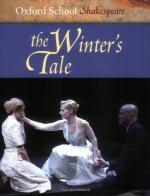Camillo. Sir, it is three days since I saw the prince. What his happier affairs may be, are to me unknown; but I have missingly noted he is of late much retired from court, and is less frequent to his princely exercises than formerly he hath appeared.
Polixenes. I have considered so much, Camillo, and with some care; so far that I have eyes under my service which look upon his removedness; from whom I have this intelligence,—that he is seldom from the house of a most homely shepherd,—a man, they say, that from very nothing, and beyond the imagination of his neighbours, is grown into an unspeakable estate.
Camillo. I have heard, sir, of such a man, who hath a daughter of most rare note: the report of her is extended more than can be thought to begin from such a cottage.
Polixenes. That’s likewise part of my intelligence: but, I fear, the angle that plucks our son thither. Thou shalt accompany us to the place; where we will, not appearing what we are, have some question with the shepherd; from whose simplicity I think it not uneasy to get the cause of my son’s resort thither. Pr’ythee, be my present partner in this business, and lay aside the thoughts of Sicilia.
Camillo.
I willingly obey your command.
Polixenes.
My best Camillo!—We must disguise ourselves.
[Exeunt.]
Scene III. The same. A Road near the Shepherd’s cottage.
[Enter autolycus, singing.]
Autolycus.
When daffodils begin to peer,—
With, hey! the doxy over the dale,—
Why, then comes in the sweet o’ the year:
For the red blood reigns in the winter’s
pale.
The white sheet bleaching on the hedge,—
With, hey! the sweet birds, O, how they
sing!—
Doth set my pugging tooth on edge;
For a quart of ale is a dish for a king.
The lark, that tirra-lirra chants,—
With, hey! with, hey! the thrush and the
jay,—
Are summer songs for me and my aunts,
While we lie tumbling in the hay.
I have serv’d Prince Florizel, and in my time wore three-pile; but now I am out of service:
But shall I go mourn for that, my dear?
The pale moon shines by night:
And when I wander here and there,
I then do most go right.
If tinkers may have leave to live,
And bear the sow-skin budget,
Then my account I well may give
And in the stocks avouch it.
My traffic is sheets; when the kite builds, look to lesser linen. My father named me Autolycus; who being, I as am, littered under Mercury, was likewise a snapper-up of unconsidered trifles. With die and drab I purchased this caparison; and my revenue is the silly-cheat: gallows and knock are too powerful on the highway; beating and hanging are terrors to me; for the life to come, I sleep out the thought of it.—A prize! a prize!




